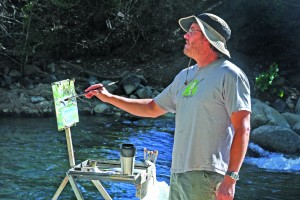by Ed Quillen
The first time I heard of “Over the River” was about the time Martha and I started this magazine, circa 1994. Christo and Jeanne Claude held a meeting in Salida, which I didn’t attend because I didn’t care.
So what if some loopy artist proposed to suspend fabric panels across the Arkansas River for a few days? It’s not as though the valley between Salida and Cañon City is a pristine wilderness or immaculate wildlife refuge.
Back then, 20 trains a day rumbled up and down the railroad tracks, and the highway side boasted tacky low-end tourist traps – rubber tomahawk shops, seedy cabin courts, authentic Colorado geodes imported from Brazil, that sort of thing. Plus there are huge power lines, old mines and quarries, dilapidated charcoal and lime kilns – this was an industrial zone for a century and more.
The issue faded as Christo and his late wife, Jeanne Claude, found other projects, like wrapping the Reichstag in Berlin and the Gates of New York’s Central Park (the latter blocked by Mayor Rudolph Giuliani, but allowed by his successor, Michael Bloomberg).
Now Christo has returned. He needs a permit to use federal land, which requires an Environmental Impact Statement. The draft version was released in July, and the local paper bristles with letters opposing the project. Reading those has not persuaded me to join the anti-Christo crusade.
Just think of the catastrophe that could result if there was an 8.5 earthquake just as a tornado came up the canyon and a gas-tanker truck tipped over. Well, yeah, but if all that happened, we’d be hosed even if Christo had never left Bulgaria. I grant that apocalyptic hyperbole is fun, but it doesn’t lead to reasonable discourse.
Most opposition appears to come from people who live along the canyon. If I lived there, I might oppose the project, too. But I don’t, and I find many of their arguments hypocritical. Let’s look at some of them.
1) If you care about the environment, you have to oppose this project.
Maybe, but if you cared about the environment, you wouldn’t live where you must drive 50 miles a day to get to and from work or school, or to buy groceries or otherwise carry on daily life. You’re routinely polluting our air and indirectly causing oil wars and Gulf spills which damage the environment.
Or you might just have a second home along the canyon, an exercise in consumption, which translates into pollution.
Anyway, if you want to get all green about Over the River, walk your talk.
2) Over the River will disrupt wildlife, from the fish in the river to the critters on the ground and the birds of the air.
I’m sure it will. But traffic and houses also disrupt wildlife. This isn’t a question about whether wildlife will be disturbed, because that’s been happening for a long time.
Further, Over the River is a temporary installation, unlike the houses, roads, power lines, state park facilities and bridges that last for decades – and disturb and disrupt wildlife.
As far as I know, there are no any endangered species along the corridor who’d face extinction if some cables and fabric across the river disturbed their habitat.
3) Even after it is dismantled, Over the River will leave permanent scars on the landscape, such as the covered-up footings for the cable anchors.
And so what? I can’t even begin to count the scars already present in that canyon, or imagine why a few more would matter. A lot has changed since 1807, when Zebulon Pike ventured downstream from the site of Salida, and experienced “great difficulty” in getting his horses through “a narrow channel with immense cliffs on both sides.”
Two centuries later, there’s the railroad. And old lime and calcite quarries. And houses and the roads to various real-estate developments served by power lines. And if we just eliminated that big blemish called U.S. 50, we wouldn’t have canyon commuters whining about scars on the landscape.
4) Emergency access will be hampered during construction, display, and dismantling.
First off, if you really need to be at a medical facility at certain times, you might try living near one. Second, U.S. 50 is not the most reliable of routes as it is.
Considering the challenges – this is a narrow, twisting road prone to rockslides and the like – the Colorado Department of Transportation does a good job of keeping it open. But it isn’t always open.
I asked CDOT. In all of 2009 and the first seven months of 2010, U.S. 50 between Salida and Cañon was closed for a total of 35 hours. The closures were all on account of accidents, rather than rockslides, wretched weather or other “acts of God.” All told, there were 10 recorded closures. The longest was for more than nine hours, from 10:37 p.m. on Jan. 28 of this year to 8:07 a.m. the next day.
You cannot rely on mountain highways always being open. Recall that this spring, Colorado’s major east-west highway, Interstate 70, was closed for four days through Glenwood Canyon on account of falling rocks, and Christo was nowhere near that scene.
Living in a rural area means you can’t always get from here to there in a timely manner. That’s just a fact of life in Central Colorado, Christo or no Christo.
Further, Christo will pay for a helicopter to stand by, ready for emergencies, during his peak period. At the moment, there’s no helicopter standing by. So it could be argued that emergency access will be improved by Over the River.
5) Salida and Cañon residents who refuse to oppose Over the River are just out for the almighty dollar because they stand to profit from the project.
And if you’re complaining that Over the River might delay your daily commute, why is it that you drive off to work? Isn’t it to make some money? If it’s right for you to want a few more dollars by despoiling the environment and putting more traffic on the highway, why is it so wrong for other people?
If you’re from outside the canyon and oppose Over the River, why are you trying to deprive locals of some work and commerce? Do we have some sort of moral obligation to maintain this area to your specifications at all times, no matter what it might cost in lost opportunity?
6) I have a right to the quiet, rural place I moved to, and nobody has the right to change that.
Well, I sympathize. Especially if you live off the grid and grow your own food and generate your own power and don’t commute to work in some distant place. But in that case, you wouldn’t need to care about congestion on U.S. 50, and I doubt we’d be hearing from you.
But for those of us who are part of society, things change. When we moved into our current house, the parochial school across the street was closed and our street was quiet. Then the school district rented it for kindergarten and sixth-grade classes, to relieve crowding at Longfellow Elementary until a new middle school could be built. Voila, lots of traffic. The middle school opened – alas, just four blocks down the street, so traffic again. And now the old parochial school hosts the after-school Boys and Girls clubs. Again, traffic and noise.
We can’t control everything around us. Sometimes we just need to adapt because the changes benefit our friends and neighbors.
To look at this another way, this area has always been jerked around by outside forces. Nobody here made the decision to close down Climax Molybdenum and the Monarch Quarry in the early 1980s. Nobody here decided to put the railroad line “out of service” so that Phil Anschutz could make another $3 billion. Nobody here said “Let’s bring in a Wal-Mart and see how many local shops it can kill.”
So here’s Christo, another outside force, a multi-national corporation if you will. And horror of horrors, he plans to put people to work hereabouts, while bringing more visitor money in. Damn those outsiders.
7) No one should have to put up with the construction noise, delays, rock dust, drilling and the like.
On a fine fall day in 2008, I had some business in Pueblo, and headed down U.S. 50. I spent about 45 minutes waiting in a long line of parked cars. CDOT was scaling rocks – that is, going up the cliffs and knocking down loose rocks so they could be removed by crews at the bottom, rather than waiting for the rocks to fall at a less convenient time.
What I did not see were protesters toting signs against all this noise and disruption and delay. Presumably, canyon residents believed the benefits of safer future travel outweighed the hassles. Many don’t feel that way about Over the River. So it isn’t the hassle they really object to, it’s that the hassle seems to serve no purpose, except perhaps augment Christo’s already immense ego. And, perhaps, to put a little money in local pockets.
8) Over the River is not, by any stretch of the imagination, a work of art.
I’m not enough of an æsthete to argue that this installation is the next Sistine Chapel. I do know that everyone I know who visited the Gates in New York came away favorably impressed, even those who initially thought it was silly.
When our daughter Abby was in high school, she dated a boy named Ben Venna, He was a pretty good artist – he did a cover or two for us when we ran this magazine. Ben and his mother went to Berlin to see Christo’s wrap of the Reichstag. Upon their return, I asked him about it.
“It gives you a totally different idea of the building,” he said. “You see it as a shape in a place, instead of all the details like the pillars and towers. So it’s made me look at all buildings differently now.”
I suppose that’s what art can do – make us see things differently, thus expanding our ways of understanding what’s around us. I have no idea whether Over the River will do that.
But it might. I suppose I’d have to see it to know, and all those would-be art critics sounding off in the papers – wouldn’t they, too, have to see it to know? So I’m not exactly swayed by their derision about drapes that they’ve never seen.
As I said, if I lived along the canyon, I might be against it. But I don’t. I live in a town with a precarious economy where we might see a few dollars from Over the River, a town with a lot of marginal ma-and-pa enterprises – and their well-being concerns me a lot more than the plight of some whiney canyon commuters.
Ed Quillen looks forward to renting his Salida house for $5,000 a week to a wealthy New York art fancier during Over the River.


